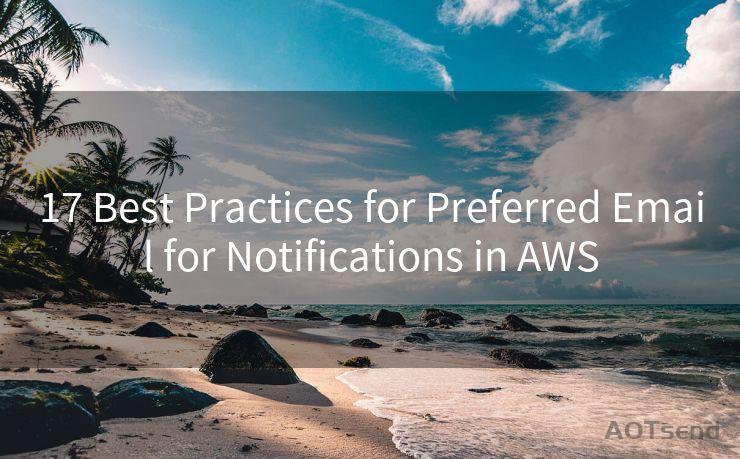17 Best Practices for Preferred Email for Notifications in AWS




When it comes to managing cloud services on Amazon Web Services (AWS), staying informed about the status of your resources and potential issues is crucial. Email notifications play a vital role in this process. To ensure you're getting the most out of AWS's email notification system, here are 17 best practices to follow:
1. Verify Email Addresses
Before setting up notifications, ensure that all email addresses are valid and active. This prevents important alerts from going to an unattended inbox.
2. Use Dedicated Email Addresses
Create a dedicated email address for AWS notifications to keep them separate from your regular inbox. This helps in quickly identifying and responding to alerts.
3. Configure SNS Topics
Utilize Amazon Simple Notification Service (SNS) to create topics for different types of notifications. This allows for fine-grained control over who receives specific alerts.
4. Set Up CloudWatch Alarms
Integrate CloudWatch alarms with SNS to automatically send email notifications when certain thresholds are crossed, such as CPU utilization or disk space usage.
5. Customize Alarm Actions
Tailor alarm actions to send detailed messages about the triggered event. This context helps recipients understand and respond appropriately.
6. Filter Notifications
Use SNS's message filtering feature to ensure only relevant notifications are sent to specific subscribers.
7. Enable Detailed Billing Alerts
Stay on top of your AWS spending by enabling detailed billing alerts. These emails provide a breakdown of your costs as they occur.
8. Monitor Multiple Accounts
If you manage multiple AWS accounts, centralize your email notifications to a single inbox for easier monitoring.
9. Test Notifications
Regularly test your notification setup to ensure emails are being sent and received correctly.
10. Use Templates for Consistency
🔔🔔🔔
【AOTsend Email API】:AOTsend is a Managed Email Service for sending transactional emails. Support Email Types: reminders, authentication, confirmations, notifications, verification codes, invoices, password resets, account activations, billing statements, two-factor authentication (2FA), and one-time passwords (OTP) emails, etc. $0.28 per 1000 Emails. 99% Delivery, 98% Inbox Rate.
You might be interested in:
Why did we start the AOTsend project, Brand Story?
What is a Managed Email API, How it Works?
Best 25+ Email Marketing Platforms (Authority,Keywords&Traffic Comparison)
Best 24+ Email Marketing Service (Price, Pros&Cons Comparison)
Email APIs vs SMTP: How they Works, Any Difference?
Create standardized email templates for different types of notifications to ensure consistency and clarity in messaging.
11. Archive Important Notifications
Set up a system to archive important notifications for future reference or auditing purposes.
12. Protect Sensitive Information
When sending notifications, ensure that sensitive information is properly redacted or encrypted.
13. Utilize Multi-Factor Authentication
Enhance security by requiring multi-factor authentication for accessing email accounts that receive AWS notifications.
14. Regularly Update Contact Information
Keep your contact information up to date to ensure notifications reach the right people.
15. Monitor Delivery Rates
Track the delivery rates of your notifications to identify any potential issues with email providers or spam filters.
16. Leverage Third-Party Tools
Consider using third-party tools that integrate with AWS to provide additional functionality, such as escalation procedures or incident management.

17. Continuously Review and Improve
Regularly review your notification setup and make adjustments based on feedback from recipients to ensure the system is effective and efficient.
By following these best practices, you can ensure that your AWS email notifications are timely, relevant, and actionable. Staying informed is key to maintaining the health and security of your AWS environment.




Scan the QR code to access on your mobile device.
Copyright notice: This article is published by AotSend. Reproduction requires attribution.
Article Link:https://www.mailwot.com/p3450.html



